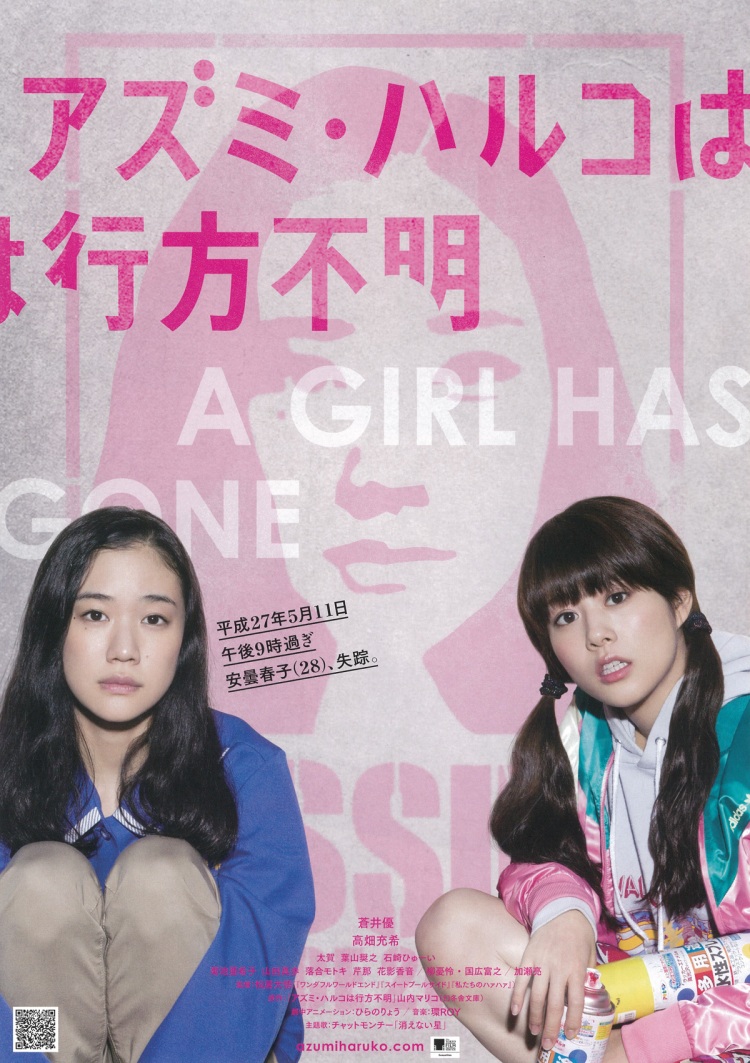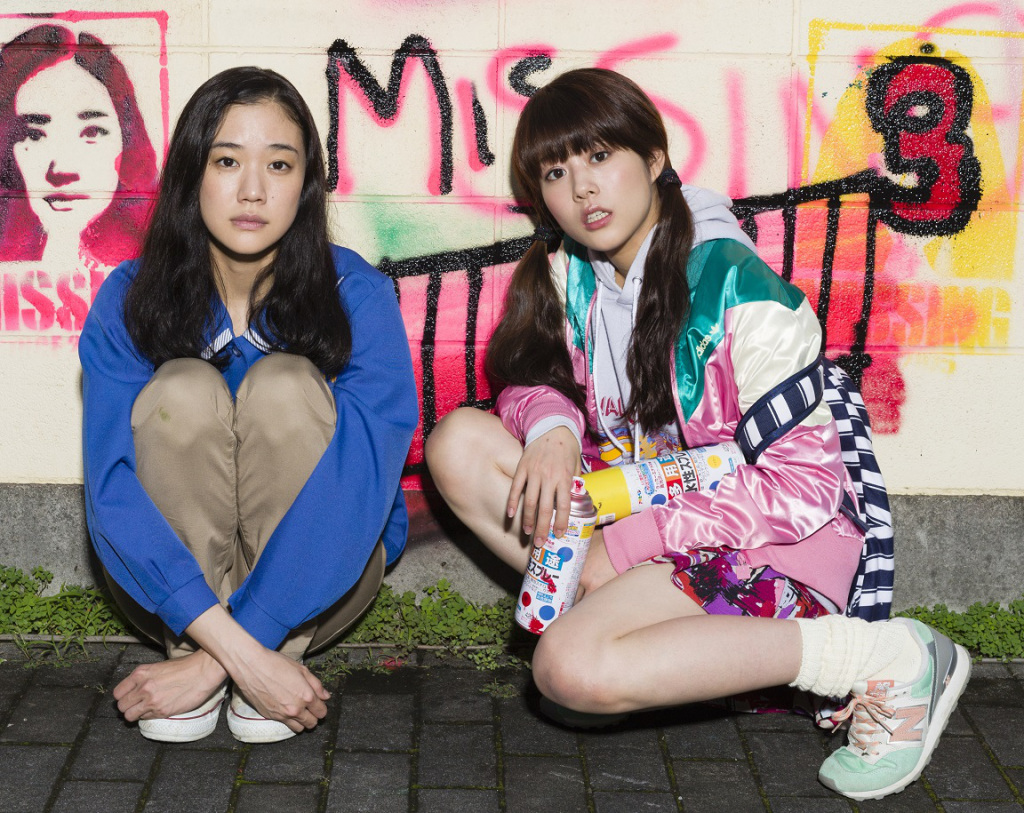 Japanese Girls Never Die (アズミ・ハルコは行方不明, Azumi Haruko wa Yukuefumei) but, like old soldiers, only fade away in Daigo Matsui’s impassioned adaptation of the Mariko Yamauchi novel. Crushed by a misogynistic society, these are women who may well want to disappear if only as an alternative to finally being forced into submission to the predefined paths of womanhood – i.e. marriage and motherhood (and nothing else) that have been carved out for them. The young are, however, fighting back if in less than admirable ways. The best revenge on an oppressive society may be living well in one’s own way, but when that same society is at great pains to frustrate your goal the options are few.
Japanese Girls Never Die (アズミ・ハルコは行方不明, Azumi Haruko wa Yukuefumei) but, like old soldiers, only fade away in Daigo Matsui’s impassioned adaptation of the Mariko Yamauchi novel. Crushed by a misogynistic society, these are women who may well want to disappear if only as an alternative to finally being forced into submission to the predefined paths of womanhood – i.e. marriage and motherhood (and nothing else) that have been carved out for them. The young are, however, fighting back if in less than admirable ways. The best revenge on an oppressive society may be living well in one’s own way, but when that same society is at great pains to frustrate your goal the options are few.
As per the title, 28-year-old admin assistant Haruko Azuma (Yu Aoi) has gone missing. Her face, stolen from her missing poster, has been co-opted by a pair of petty punk idiots trying to come-up with a viral graffiti tag to rival Obey, but there’s no art or intention behind their minor act of social transgression so much as bravado and pithy rebellion. Nevertheless, Haruko’s image, plastered throughout the city, has become a hot topic on Japan’s social networking sites where a hundred trolls wade in with their prognostications and salacious fantasies of her violent death at the hands of a sex maniac.
Meanwhile, in an ironic subversion of the normalities of city life, young men have been urged to avoid walking alone at night following a spate of attacks by a gang of rabid school girls taking revenge on the male sex. No exact motive is given for their crusade save the missing poster that precedes Haruko’s and asks for information on a disappeared school girl, but goodness knows they have enough obvious reasons to have decided on a course of vigilante justice.
Haruko’s world is one defined by entrenched sexism. At 28 she finds herself embarrassed to be a still single woman at a wedding while a chance encounter with a school friend (Huwie Ishizaki) at a supermarket leads to more awkwardness when he pointedly remarks he assumed she’d be a housewife by now, and that she looks “old”. At work, Haruko’s colleague Yoshizawa (Maho Yamada), 37 and still unwed, is the butt of hundred jokes for the two middle-aged men who, for some reason, are their bosses though they hardly seem to do any work and automatically earn seven times Yoshizawa’s salary. The bosses urge Haruko to dress in more feminine fashions, asking invasive questions about her personal life while disparaging single women like Yoshizawa who they blame for Japan’s declining birthrate and a related raise in their taxes, avowing that women over 35 are essentially pointless seeing as their eggs are already “rotten”. Yoshizawa has developed a thick skin for their constant needling, realising that it amounts to an odd combination of sexual harassment and constructive dismissal campaign. Unwilling to pay a “higher” salary to an “older” woman, they are waiting for her to quit so they can hire a young and pretty new girl who will be naive enough to accept the pittance they intend to pay her.
It might be thought that the attitudes of Haruko’s bosses are a reflection of their generation, but the two young punks, Yukio (Taiga) and Manabu (Shono Hayama), are no different. 20-year-old Aina (Mitsuki Takahata), a bar girl with ambitions to enter the beauty business, gets swept into their unpleasant orbit after getting into a “relationship” with Yukio, but Yukio thinks of her only as a plaything, even going so far as to encourage the shy Manabu to try his luck because (he claims contemptuously) Aina is the kind of girl who’ll go with anyone. Later she becomes a key part of their mini graffiti movement, but once the pair start to get a little recognition they essentially erase Aina from the story taking all the credit for themselves. Aina, poignantly looking up at the poster advertising the boys’ big moment in the same way she had gazed at Haruko’s missing poster on the police station notice board, realises she’s finally had enough of all their lies and of being made to feel invisible in a society which refuses to recognise her as anything more than an object for exploitation.
Haruko’s face is literally plastered all over town, but she remains essentially faceless, her image stolen and stripped of its identity to be repackaged as a soulless symbol for two idiotic boys who not only do not care who she is or might have been but only seek to profit from claiming to be allies in a struggle while simultaneously propping up the opposing side. The image does, however, gain its own independent power, speaking for all the oppressed and belittled women who find themselves essentially disappeared in being forced to abandon their hopes and dreams in the face of extreme social pressure. The school girls are fighting back – the next generation will (perhaps) not be so keen to remain complicit in the social codes which restrict their prospects. Then again, as the image of Haruko tells one of her lost disciples, the best revenge is living well. Choosing to absent oneself from a system of social control, going missing in a more positive sense, may be the best option of all.
Screened as part of the Japan Foundation Touring Film Programme 2018.
Screening again:
- Dundee Contemporary Arts – 26 February 2018
- HOME – 27 February 2018
- Phoenix Leicester – 1 March 2018
- Filmhouse – 3 March 2018
- Showroom Cinema – 6 March 2018
- Firstsite – 9 March 2018
- Exeter Phoenix – 13 March 2018
- Queen’s Film Theatre – 18 March 2018
Original trailer (English subtitles)

1 comment